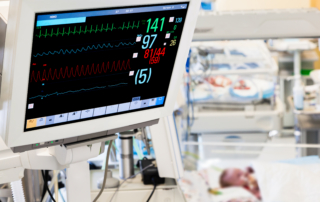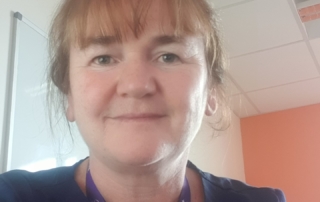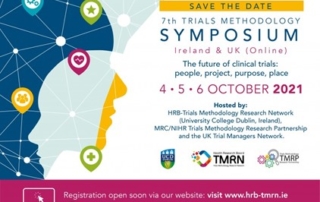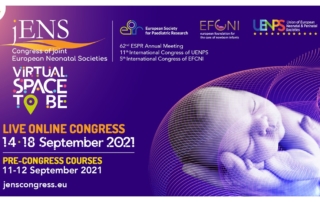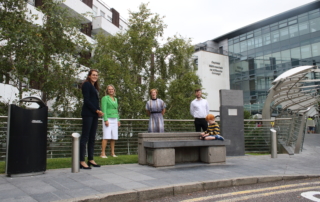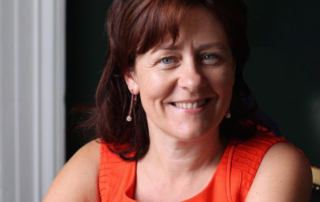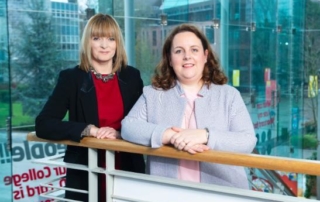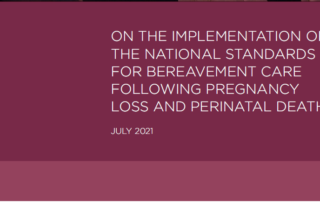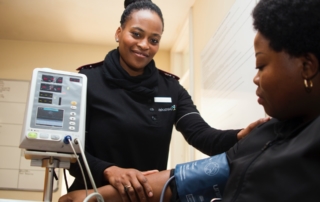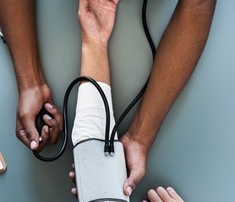INFANT Centre News
PhD Profile: Kaiyu Yu Talks Decision Support Tools for Newborn Brain Protection
An emerging expert in the field of biomedical engineering, Kaiyu Yu joined INFANT as a PhD researcher in July 2021 to begin working on an SFI Frontiers for the Future project that is developing decision support tools for newborn brain protection at INFANT. The newborn brain is vulnerable to injury around the time of birth. Decision support systems based on artificial intelligence can turn data from devices that measure vital signals from the brain, heart and circulatory system into information that can help clinicians to treat critically ill infants. However, these signals are complex and the interaction between them is not completely understood. This project will develop new mathematical and signal processing models that will facilitate the next generation of computer algorithms that will help doctors deliver specific and urgent medical interventions to improve the long-term health and quality of life for these infants. The ambitious project will lean on Kaiyu’s expertise in developing machine learning algorithms and could help clinicians to monitor, predict and treat low blood pressure among pre-term infants before a serious issue may arise. Clinicians want to be able to monitor a pre-term baby’s blood pressure. They do this by measuring some physiological signals, such as EEG, ECG and NIRS readings. I want to be able to develop a system that collates, processes, segments and models EEG, ECG and NIRS data [...]
INFANT Led European Network to Advance Development of Algorithms that Detect Brain Injuries in Infants
INFANT’s Dr John O’Toole will lead a team of international researchers to accelerate the development of AI Technologies that detect brain injuries in infants. Working alongside a team of scientists, clinicians and technical experts from 14 different European countries, Dr John O’Toole aims to build capacity and strengthen cooperation among international research groups, with the goal of developing algorithms that will minimise the risk of babies developing catastrophic life-long neonatal brain injuries. Insufficient oxygen around the time of birth can cause brain injury. For babies born prematurely, the heart and lungs may struggle to adapt to the new environment which can lead to brain injury too. Brain monitoring of a tiny infant in an intensive care unit is challenging. It can be difficult and slow to interpret the complex brain-wave patterns. AI systems are a perfect fit to this problem, as they can be designed to automatically recognise signs of brain injury. Funded by the European Cooperation in Science and Technology, the researchers involved in the AI-4-NICU project plan to build on existing cot-side technologies, such as devices that measure brain waves, by including AI algorithms to detect markers of brain injury. This, Dr O’Toole anticipates, will lead to the development of decision-support tools that will help clinicians in neonatal intensive care units to quickly identify potential brain injuries that can result in death, cerebral [...]
PhD Profile: Kimia Rezaei on Developing Algorithms to Measure Abnormal Biosignals
One of five PhD students to begin their studies at INFANT this semester, Kimia Rezaei comes to University College Cork with a great deal of academic and industry experience. After completing a Masters in electrical engineering at Islamic Azad University in Iran during 2014, Kimia sought out and secured a role with Sahand Parsian Gharb Communication Service Company, where she developed an advanced knowledge of mobile networks and Ericsson’s sophisticated equipment and software. During that time, Kimia also enhanced her academic profile, publishing three articles in peer reviewed journals. Focusing each of her publications on the segmentation and classification of brain tumour images using machine learning algorithms, Kimia developed a specialism in a field that naturally aligned with INFANT’s research strengths. Working under the supervision of Professor Liam Marnane and Dr Gordon Lightbody, Kimia will be given the opportunity to enhance her knowledge and expertise as she seeks to develop an algorithm that will measure the symptoms that trigger abnormal biosignal readings among infants. Kimia’s PhD project leans on her most recent publication, which demonstrated how radiologists can employ machine learning algorithms and computer-aided diagnosis systems to make more informed medical decisions. If we can accurately predict abnormal EEG and ECG signals, we can begin to pre-emptively diagnose and treat infants. To do this, my research aims to accurately measure things like brain activity and [...]
PhD Student Profile: Mary Anne Ryan, General Nurse, Paediatric Nurse and Mid-Wife
Introducing herself as a registered general nurse, paediatric nurse and a mid-wife, INFANT PhD researcher, Mary Anne Ryan, is fervent in her desire to protect brain development of pre-term babies who pass through the neonatal unit in CUMH. Mary Anne describes how advances in technology have pushed back the limits of viability, reducing mortality associated with preterm birth. However there has been little change in morbidity amongst the preterm infant group. A clinical researcher, Mary Anne has a specific interest in the importance of sleep to the developing brain, explaining that sleep is a prerequisite for normal growth and a precondition for the normal development of the infrastructure of the brain. ‘There is a reason why preterm babies may sleep for up to 90% of the day. Whilst it may appear to be physically passive and restful, a high level of brain activity is maintained, which is crucial to a preterm infants’ developing brain’. ‘While we monitor heart rate, respirations, temperature, how well the body is oxygenated and the nutritional intake of preterm infants in the neonatal unit, we do not routinely monitor brain activity’. Brain activity may be monitored through electroencephalography (EEG). Sleep states (active sleep and quiet sleep) are associated with particular neural activity patterns which change with brain maturation. ‘Knowing what features and patterns are normal for gestational age we can determine [...]
INFANT Seminar Series: Dr Nahla Ahmed and Dr Antoine Giraud to Discuss Their Research
The INFANT seminar series will continue this Friday, October 15th 2021 at a slightly later time of 12.30 pm. For the coming weeks, we hope to welcome our new clinical fellows and PhD students and learn about some of their plans while here in INFANT. First up are two new clinical fellows. Dr Nahla Ahmed, a paediatric registrar, will be discussing EEG in the hypotensive pre-term infant, and Dr Antoine Giraud, a visiting French clinical fellow will be discussing EEG changes in pre-term infants associated with peri-natal inflammation.
Dr. Eoghan McKernan Takes Part in 7th Annual Trials Methodology Symposium
Dr. Eoghan McKernan took part in the 7th Annual Trials Methodology Symposium, presenting an exciting Post-PhD career perspectives & viewpoints presentation, with an emphasis on Infrastructure Management. Eoghan presented a case study on infrastructure management at INFANT. This year’s theme is ‘’The Future of clinical trials: people, project, purpose, place’’ The prestigious event, which was hosted between 4-6 October, can be accessed online at www.hrb-tmrn.ie The event is hosted by HRB-Trials Methodology Network (UCD), MRC/NIHR Trials Methodology Research Partnership and the UK Trial Managers Network. The interactive event includes presentations from leading international speakers with dedicated Q&As, and live discussions. To find out more visit: 7th Annual Trials Methodology Symposium - HRB-TMRN
New Survey Examines the Care Experiences of Women and Their Partners Who Have Had Recurrent Miscarriages
Miscarriage affects one in four couples, while at least 1-3% will experience at least two or more first-trimester miscarriages in a row, known as recurrent miscarriage. The loss of a baby at any stage of pregnancy can have a devastating impact on a woman, her partner, and their family, even more so if this loss occurs several times. Led by Professor Keelin O’Donoghue, researchers from the Pregnancy Loss Research Group at Cork University Maternity Hospital (CUMH) and University College Cork are examining services and supports in Ireland for women/couples who experience recurrent miscarriage as part of efforts to standardise and improve services across the country. Working as part of the Health Research Board-funded RE:CURRENT (Recurrent miscarriage: Evaluating CURRENT services) Project, the research team would like to hear from women/couples about their care experiences. If you/your partner have had two or more consecutive first-trimester miscarriages and received care for these in Ireland during the last ten years and would like more information about how to take part, please visit https://tinyurl.com/recurrentcaresurvey. Jennifer Ui Dhubhgain has three young children and lost six babies on her journey to completing her family. Through her work with the Miscarriage Association of Ireland, she supports women and men who have experienced pregnancy loss. Speaking about the RE:CURRENT Project Jennifer said, “Recurrent pregnancy loss takes not only a physical toll but also an [...]
INFANT Seminar Series 2021/22: Dr Sophie Casey Presents ‘Inflammation Driven Molecular Alterations in Disorders of the Perinatal Brain’
In our first seminar of the new academic year, Dr Sophie Casey will present 'Inflammation Driven Molecular Alterations in Disorders of the Perinatal Brain' on 24th September at 12pm. Synopsis Hypoxic ischemic encephalopathy and Autism Spectrum Disorder are time sensitive and have narrow therapeutic windows of opportunity. Despite this, diagnosis is typically performed too late to beneficially inform clinical and therapeutic decision making and is often subjective or unavailable due to injury severity or socioeconomic factors. Neonates who are diagnosed with these disorders often receive treatment too late to confer beneficial levels of protection, or treatment is inappropriate. HIE and ASD are linked by inflammation and the involvement of inflammatory markers which may offer promising biomarker and/or therapeutic candidates.
Five INFANT Researchers Contribute to jENS 2021 Congress
Professor Geraldine Boylan, Professor Deirdre Murray and Dr Sean Mathieson, all took part in the jENS 2021 Congress this week, alongside INFANT Ph.D candidates Sonia Lenehan and Mary Anne Ryan. The prestigious event, which took place between 14-18 September, featured an exciting scientific programme with contributions from leading international speakers. Taking place online, the Congress investigated topics such as neurology, perinatal practices and neonatal infectious diseases / immunology. The interactive event included dedicated Q&As, live discussions and polls, providing an engaging atmosphere for INFANT researchers to showcase how they are solving some of the challenges associated with pregnancy, birth, infancy and childhood. Find out about the jENS 2021 Congress. INFANT Contributions: 14 September Professor Deirdre Murray Role: Discussant Session: MEET & GREET & DISCUSS: controversies in neonatology – Brain Mary Anne Ryan Role: Speaker Session: Meet & Greet &Discuss: controversies in neonatology - Nursing Title: Protecting sleep in the NICU Synopsis: The immature preterm infant's brain is vulnerable to adverse outcome. Sleep is neuroprotective. Minimising stress and protecting sleep in the neonatal unit will support normal brain development. 15 September Professor Deirdre Murray Role: Speaker Session: PARALLEL SESSION 1- BRAIN 1 - Outcome Assessment Talk: Outcome assessment in the 21st century Doctor Sean Mathieson Session: POSTER SESSION 1 - BRAIN 1 Synopsis: Neonatal Encephalopathy (NE) is a neurological disorder resulting from lack of oxygen or blood supply to the brain at birth and has the highest morbidity and mortality in low income countries. Seizure can exacerbate brain damage. We recorded EEG (brainwaves) on neonates with NE in Uganda and found a high seizure burden, highlighting the potential to improve outcome in these babies with prompt detection and treatment [...]
Harnessing gaming technology to assess brain development in young children: Liltoda grows from cutting edge research in the INFANT centre, UCC.
New technology to support non-verbal assessment of infants & young children. 31st August 2021: A new UCC spin out company, Liltoda Ltd, launched today. Liltoda will focus on harnessing the power of gaming technology for the early detection of infant brain injury. The Liltoda team aim to create a sea change in the assessment of brain development in young children. The company is the direct result of an ongoing collaboration between Ireland’s world-class Maternal and Child Health research centre, the INFANT centre, and global gaming company, Hello Games. Since 2014 Deirdre Murray, Professor of Paediatrics in UCC, and her brother Sean Murray, Founder and Managing Director of Hello Games, have worked together to study the ability of young infants to interact with touchscreen technology. The responsive nature of touchscreen tablets allows young children aged 18 months onwards to interact and solve puzzles without the need for language. Traditionally, cognitive ability in very young children is assessed based on the surrogate markers of developmental milestones. Parents can easily track a child’s speech and motor skills, but tracking their child’s thinking skills and problem solving ability is much more difficult. For this reason many children with learning difficulties are not detected before starting school. Children often have years of struggling at school before their difficulties come to light. Traditional tests such as Bayley’s Scales, were developed in the 1950s, [...]
INFANT Student Secures IRC Scholarship
INFANT centre and UCC Departments of Biochemistry and Obstetrics & Gynaecology PhD student Caroline Joyce was awarded an Employment-Based Programme Postgraduate award by the Irish Research Council on 25th August 2021. Caroline, who is a Principal Clinical Biochemist in Cork University Hospital, received the prestigious scholarship for her research into biomarker discovery for the diagnosis, management and treatment of women with Gestational Trophoblastic Disease (GTD). She was one of 28 awardees under this scheme and the only recipient in Cork. Molar pregnancy (MP) is the commonest form of GTD with an incidence of one per 600 pregnancies. First trimester ultrasound and levels of the pregnancy hormone, human chorionic gonadotrophin (hCG) can diagnose a MP with histological confirmation of trophoblastic tissue in the placenta. After a molar pregnancy, hCG levels are monitored closely until levels return to normal and most women have a good outcome. However, some patients with GTD develop persistent disease or gestational trophoblastic neoplasia (GTN) and may require surgery and/or chemotherapy. Plateauing or rising hCG levels can indicate disease recurrence but alternative more sensitive biomarkers are needed to ensure early detection and treatment of this largely curative disease. Caroline’s research will examine the molecular mechanisms underlying this rare disease under the supervision of INFANT’s Professor Keelin O’Donoghue, Professor Tommie McCarthy from UCC’s School of Biochemistry and Cell Biology, and Dr John Coulter, Consultant Gynaecologist and Clinical Lead at the National Gestational Trophoblastic Disease Centre.
Professor Keelin O’Donoghue Co-authors Report on Implementation of National Bereavement Standards across all 19 Maternity Units
Infant’s Professor Keelin O’Donoghue - https://www.ucc.ie/en/obsgyn/staff/keelin/ - has co-authored a report that aims to develop and improve perinatal bereavement care across all of Ireland’s Maternity units. Read/Download the report (PDF) here - https://www.infantcentre.ie/2021/08/18/hse-national-standards-for-bereavement-care-report/ Compiled by Prof O'Donoghue, Clinical lead for Implementation, and Riona Cotter National Programme Manager, the report highlights the dedication and hard work of healthcare professionals, support groups and voluntary organisations who work with parents bereaved through pregnancy loss and perinatal death. Titled, The Implementation of the National Standards for Bereavement Care Following Pregnancy Loss and Perinatal Death - link: https://www.infantcentre.ie/2021/08/18/hse-national-standards-for-bereavement-care-report/ , the report also acknowledges the work and commitment in each Maternity Unit to implement the standards, as well as outlining the work still to be done. Speaking following the launch of the report, Professor O’Donoghue said that she was grateful to all of those who contributed to the implementation programme. "This report shows that progress has been made in the implementation of the Bereavement Standards nationally.." “We are grateful to all the families and volunteers who shared their experiences of pregnancy loss and perinatal death with us”. “Their experiences helped inform us of what is necessary to provide high quality bereavement care in our Maternity services”. The final recommendations of the report are based on audit findings, expert opinion, best practice and the learning from experiences of bereaved parents and families, [...]
HSE National Standards for Bereavement Care – Report
The Implementation of the National Standards for Bereavement Care Following Pregnancy Loss and Perinatal Death VIEW or DOWNLOAD the Report (PDF) here: HSE National Standards for Bereavement Care Between 2017 and 2021, experts in perinatal bereavement care, bereaved parents and members of support organisations and voluntary groups came together to develop and improve perinatal bereavement care through the implementation of the Standards in all Maternity units. The enclosed report was prepared to present the programmes of work undertaken to implement the Standards. The content of this report shows the dedication and hard work of both the healthcare professionals and the support groups and voluntary organisations who work with parents bereaved through pregnancy loss and perinatal death. We acknowledge the work and commitment in each Maternity Unit to implement the Standards. Finally, we present further recommendations based on audit findings, expert opinion, best practice and the learning from experiences of bereaved parents and families, which should be a priority for every Maternity Unit. The report was compiled by Professor Keelin O'Donoghue - https://www.ucc.ie/en/obsgyn/staff/keelin/ - Clinical lead for Implementation, and Riona Cotter National Programme Manager, the report highlights the dedication and hard work of healthcare professionals, support groups and voluntary organisations who work with parents bereaved through pregnancy loss and perinatal death. VIEW or DOWNLOAD the Report (PDF) here: HSE National Standards for Bereavement Care
Results of PARROT Ireland Trial Published in British Medical Journal
Results of PARROT Ireland Trial Published in British Medical Journal Research funded by the Health Research Board Mother and Baby Clinical Trial Network Collaborative Ireland and published by Professor Keelin O’Donoghue in the British Medical Journal, has found that using the Placental Growth Factor test in clinical practice does not improve or worsen outcomes for women and their babies. A clinical trial involving 2,313 pregnant women has found that using the Placental Growth Factor (PlGF) test does not help Clinicians improve or worsen outcomes for women and their babies. The potentially dangerous condition pre-eclampsia, which affects between 4-7% of pregnant women, causes high blood pressure and protein in urine, and may in severe cases even lead to the fatality of a mother or baby. Published in the British Medical Journal [https://www.bmj.com/content/374/bmj.n1857 ], the findings of the trial do not support the addition of PlGF testing, which had previously in other studies shown promising results in helping to diagnose pre-eclampsia or manage pregnancy complicated by pre-eclampsia. The results of the national multi-centre trial, which was led by Professor Keelin O’Donoghue [https://www.ucc.ie/en/obsgyn/staff/keelin/], along with investigators from 7 maternity units across Ireland, from UCC’s world renowned Infant Centre, leaves clinicians without an effective test that can differentiate between women presenting with high blood pressure and those affected by pre-eclampsia. “At present, we do not [...]
C4C – Press Release: First site open for patient recruitment into ‘Kawasaki Disease Coronary Artery Aneurysm Prevention trial (KD-CAAP)’ study
The IMI conect4children (c4c) consortium are pleased to announce that the first site is now open for the ‘Kawasaki Disease Coronary Artery Aneurysm Prevention trial (KD-CAAP)’ study as of 28 September 2020 at Great Ormond Street Hospital NHS Foundation Trust. Kawasaki disease is a disease where arteries, particularly the coronary arteries in the heart, become inflamed, sometimes causing irreversible heart damage, heart attacks or even death. To prevent heart damage, Kawasaki disease in children and young people must be recognised by clinicians early, and promptly treated with anti-inflammatory medicines. This study will assess the effectiveness of adding steroids to standard treatment in children with Kawasaki Disease, and aims to recruit 262 children as part of the study. The study will continue to open in approximately 60 sites in 15 countries across Europe. In April 2019, c4c announced the selection of its first portfolio of pan-European paediatric studies, aimed at advancing the understanding of high priority medicines commonly used in babies, children and young people in Europe. The KD-CAAP study is the first of the proof of viability studies, to begin recruitment. The other academic studies, shown below, plan to begin recruitment later this year, despite initial delays due to the COVID-19 pandemic. View Full Press Release Here: Conect4Children - PRESS RELEASE Downloads: Conect4Children (C4C) - PRESS RELEASE Related Links: https://conect4children.org/
Press Release for: BABY LOSS AWARENESS WEEK
Wednesday 14 October 2020 RESEARCHERS FROM PREGNANCY LOSS RESEARCH GROUP AND INFANT CENTRE UCC/CUMH ARE WORKING TOGETHER TO HELP IMPROVE SERVICES FOR THOSE WH0 EXPERIENCE RECURRENT MISCARRIAGE October 13th 2020: Baby Loss Awareness Week, which runs from October 9 – 15, is an international event which seeks to raise awareness of the issues affecting families who have experienced a loss of a pregnancy or baby. Researchers from the Pregnancy Loss Research Group and Infant Research Centre at Cork University Maternity Hospital (CUMH)/ University College Cork share some of the work that they are doing with those who have experienced the loss of a pregnancy or baby, particularly in the area of recurrent miscarriage, as part of efforts to standardise and improve services across the country. Miscarriage affects one in four couples, while at least 1-2% will experience at least two or more first-trimester miscarriages in a row, known as recurrent miscarriage. The loss of a baby at any stage of pregnancy can have a devastating impact on a woman, her partner, and their family, even more so if this loss occurs several times. Rachel Rice, a Parent Advocate said “Despite having had a first miscarriage, nothing prepared me for the reality that it could happen again and again and again. It is a truly devastating experience and women must be assured that the services they require from [...]
Infant Mental Health
Friday 19 June 2020 Here at the INFANT Research Centre, we specialise in the science of babies brains! The brain develops more in the first five years than at any other stage of our life. The first 1,000 days of life are vital as the brain and biological pathways formed during this time can affect physical and mental health for the rest of a babies life. During pregnancy and infancy, it is obvious how physically reliant babies are on their parents and caregivers. They are socially and emotionally connected to us in so many fascinating ways. The way we interact with babies and infants shapes their brain development. Infant Mental Health is the term used to describe the ability of a child to form close relationships with those around them like mum and dad, siblings and grandparents, to understand and express their emotions and to explore and learn about their environment around them. When one hears the phrase ‘infant mental health’, there may be a tendency to be concerned that is it connected with mental illness and be puzzled as to how the term mental health could be associated with the stage of infancy. Babies are like scientists, exploring the world around them by sending out messages to see what happens, how things work, and where they fit in! They serve the ball and wait [...]
INFANT student wins Student Entrepreneur Award
Friday 12 June 2020 INFANT PhD student Mark O’Sullivan has won the top prize at Enterprise Ireland's Student Entrepreneur Awards 2020 for his Neurobell medical device. Mark was one of 10 finalists participating in the virtual final of the third-level Student Entrepreneur Awards. Mark developed Neurobell to support early detection and monitoring of brain injuries in newborns and has being working on the project since 2016. With the device, he aims to help clinicians diagnose abnormal brain activity faster and with greater accuracy. “This award will help Neurobell on the road to commercialisation and help me excel as an entrepreneur,” “Sincere thanks to my academic advisors and colleagues, and to the entrepreneurship ecosystem in UCC which has provided me with the support and resources to achieve this." He will now receive a €10,000 cash prize fund and have the opportunity to avail of specialist advice and assistance from Enterprise Ireland to help turn his enterprise idea into a business reality. Well done Mark!
INFANT Researchers share in €1.4m SFI funding
Tuesday 09 June 2020 Researchers at INFANT have received funding for a pilot project that aims to reduce the number of hospital check-up visits for pregnant women during the COVID-19 pandemic. With funding from Science Foundation Ireland, INFANT researchers will apply connected technology to enable pregnant women to have their blood pressure monitored remotely. The project is one of 11 proposals which is to share funding of €1.4m under the SFI-coordinated research and innovation response to the COVID-19 pandemic, as announced today by Minister for Business, Enterprise and Innovation, Heather Humphreys TD. If a pregnant woman’s blood pressure is too high for too long and left uncontrolled, it can affect the baby’s growth and may be a sign of a potentially life-threatening condition called pre-eclampsia. In some cases, women with suspected high blood pressure may need to present at the hospital for extra check-ups as well as their routine consultations. This is more difficult during the COVID-19 pandemic. The study at Cork University Maternity Hospital will use remote technology to monitor blood pressure in pregnant women in the COVID-19 pandemic, including inpatients and outpatients and COVID-positive and COVID-negative mothers. The 500 pregnant women who enrol in the project will use an automated device connected to the INFANT Research Centre’s LEANBH platform to measure their blood pressure and relay the results to the clinical team. The mothers can then be [...]
INFANT giving a voice to children with special needs
Friday 29 May 2020 INFANT has launched a new study to evaluate the impact of COVID-19 restrictions on the accessibility of support services for carers of children with special needs, and the effect, if any, on carer well-being. Carers Access to REspite services and support during COVID-19 (CARE Study) is about giving a voice to children with special needs and their carers during COVID-19 pandemic. Participation is open to people that are 18 years of age or over and who are carers or guardians to a child or children with special needs in the Republic of Ireland and it involves answering a 15-minute survey, at a time that suits you. Children with physical and intellectual disabilities make up 6.7% of the Irish population and require extra supportive care and services daily, for them to participate in all aspects of life. The imposed COVID-19 restrictions will have reduced or removed their support network, which will directly impact the physical and mental development of these children. The current situation will also inevitably impact the well-being of carers and affect the quality of life for both entities.
Healthy Eating for Pregnant Women
Tuesday 26 May 2020 Since the global outbreak of COVID-19, we are being inundated with claims that certain foods, nutrients and nutritional supplements can prevent or even cure COVID-19. However, the truth about diet and COVID-19 is this: No single food, nutrient or supplement can “boost” our immune function to prevent us from catching COVID-19. Good hygiene practices and physical distancing remain the best ways of limiting our risk of infection. A healthy diet has a role in maintaining a healthy immune system and helping the body fight infection. There are a number of healthy food and lifestyle choices that you can make during this time to ensure that your body has all the nutrients it needs to keep you healthy, to help your baby grow and develop and to support your immune function. 1. Get your supply of essential nutrients Aim for a diet that includes a range of healthy, nutrient-rich foods that will deliver important vitamins and minerals for pregnancy such as folic acid, iron, calcium, vitamin D and omega-3 fatty acids. Take a folic acid supplement (400μg per day) every day for the first 12 weeks of your pregnancy and include foods that are a rich source of folic acid in your diet, such as green leafy vegetables, fortified breakfast cereals and milk. Eat foods that are rich in iron at least [...]
The Scientific Theory of Happiness
Friday 22 May 2020 Our Clinical Psychologists, Leanna Fogarty and Dr Margaret O’ Rourke have identified a number of tools and resources to help you deal with any additional stresses in your lives. We will share some bitesize tips with you every week through the INFANT website and our social media channels. There are no quick fixes but there are things that we can do to remain focused, calm, and positive. - Psychological research has discovered that happiness can be built and enhanced with five core ingredients. The word PERMA is the easiest way to remember the five important building blocks of mental health and wellbeing – all things that are very helpful right now! 1. Positive Emotions It can be hard work to be positive sometimes but the more you try the more it will become a habit. Positive emotions really help your mental health and will build and support confidence and self-belief, creativity, flexibility, optimism, perseverance, physical and mental health productivity, and energy. 2. Engagement Being fully focused and engaged on the task at hand is very good for wellbeing. Try to be fully present in the now and the tasks and activities you are engaged in - it doesn’t matter how simple or difficult the task may be. 3. Relationships Positive relationships help us build resilience, reduce stress, and improve wellbeing. Regardless of what happens at work, [...]
Support crucial for maintaining successful breastfeeding
Thursday 14 May 2020 New research led by Dr. Andrea Hemmingway, PI Prof Mairead Kiely, and the INFANT maternal and child nutrition team has been published in the British Journal of Nutrition. The study has reported that breastfeeding rates have increased slightly over the past 10 years and mothers are breastfeeding for longer. Breastfeeding is recommended, where possible, because it has many health benefits for mum and baby. It can promote the development of a baby’s immune system and protect against infection. For mums, breastfeeding reduces the risk of breast cancer and may help with a gradual return to pre-pregnancy weight. Using data from the COMBINE study - of which over 450 families from Cork and the surrounding area participated between 2015-2017 - the team analysed current infant feeding practices and explored changes in breastfeeding rates over the past 8-10 years. The COMBINE study found that 75% of mums were breastfeeding to some extent by the time they went home from the hospital and 44% breastfed solely without formula top-ups. In comparison, INFANT’s BASELINE study - led by PI Prof Deirdre Murray between 2008 and 2011 - had a breastfeeding rate of 69% at the time mums went home and 40% breastfed solely. Both studies had several follow-up visits with families during the first year. At two months of age, 36% of COMBINE babies were [...]
INFANT shortlisted to compete for €2 million prize
Monday 11 May 2020 Minister for Business, Enterprise and Innovation, Heather Humphreys, TD, today announced that twelve teams have been shortlisted to progress onto the next phase of the SFI Future Innovator Prize. Funded by the Department of Business, Enterprise and Innovation through Science Foundation Ireland (SFI), this competition is part of an overall government plan to cultivate challenge-based funding in Ireland. The two Challenges, the Artificial Intelligence (AI) for Societal Good Challenge and the Zero Emissions Challenge are run in partnership with the Department of Foreign Affairs and Trade. AI4LIFE - led by Prof Geraldine Boylan, Prof Liam Marnane and Societal Champion Dr Mairead O'Riordan - will focus on the challenge of reducing neonatal morbidity and mortality. The team plan to develop a new, easy to interpret, fetal monitoring system that will use AI assisted interpretation to monitor the vital signs of mother and baby during labour to quickly identify any issues. The AI4LIFE project has the potential to impact current clinical practice and improve the lives of families and their babies nationally and internationally. Minister Heather Humphreys, TD said: “I am delighted to announce that twelve teams will go forward to the next phase of the Future Innovator Prize competition. These teams are addressing key societal challenges Zero Emissions and Artificial Intelligence for Societal Good. I commend the researchers on their inspiring solution-focused ideas. Now more than ever, we need to ensure that ongoing significant [...]
Maternal Mental Health Awareness Week 2020
Friday 08 May 2020 This week is World Maternal Mental Health Awareness Week. The aim is to raise awareness of maternal mental health issues and to promote the help and support that is available for those who require it. Pregnancy and the period after birth can be particularly challenging and now, more than ever, it is normal to feel extra stressed, anxious, overwhelmed, or upset. The World Health Organisation (WHO) has recognised worldwide that 15.6% of pregnant women and 19.8% of women who have just given birth experience challenges in relation to mental health. It is important to be prepared and equipped to try and face these added stresses and what better way to do so than with the aid of a ‘TOOLBOX’. Our INFANT clinical psychologists Leanna Fogarty and Dr. Margaret O’Rourke have put together a quick summary of the essential tools that you need in your toolbox! Tools for you Toolbox Tool 1: GROUNDING: Try to ground yourself by becoming aware of your thoughts and feelings. Slow them down and try and connect with your body by relaxing and breathing. Refocus and engage with the world around you. Tool 2: UNHOOKING: The main aim is to try and unhook yourself from unhelpful and intrusive thoughts. NOTICE that a difficult thought or feeling has hooked you. Realise that you are distracted by a difficult thought or feeling, and notice it with curiosity. [...]



